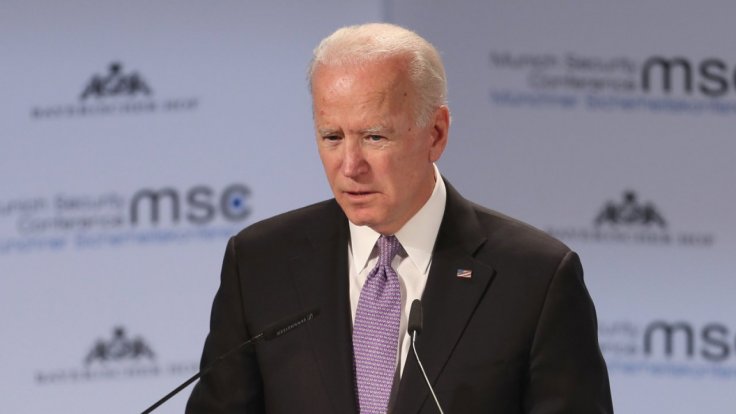Democratic presidential contender Joe Biden won the endorsement of an influential black congressman from South Carolina on Wednesday, three days before the state's primary where he is competing with national front-runner Bernie Sanders for the crucial African-American vote.
Recent opinion polls show Biden, once the leading candidate in the race to be the Democratic candidate in November, losing ground nationally to the surging Sanders among black voters.
US Representative James Clyburn's endorsement carries weight in a state where African Americans make up about 60 of the Democratic electorate and where Biden is counting on a good showing after a fourth-place finish in Iowa, fifth place in New Hampshire and second in Nevada.
Sanders, a senator from Vermont and self-described democratic socialist, has taken command of the Democratic race after his resounding win in Nevada last week. Three days after South Carolina's primary, voters in 14 states will go to the polls for the crucial Super Tuesday contests.

At an event in North Charleston on Wednesday, Sanders touted his momentum and went after Biden by name, saying the former vice president would not be able to generate the turnout needed to defeat Republican President Donald Trump on Nov. 3.
"We have come a long, long way," Sanders said of his position in the top two of the state's most recent opinion polls, along with Biden.
Clyburn, the No. 3 Democrat in the US House of Representatives, endorsed Biden at a news conference, saying he could "think of no one with the type of integrity, no one more committed to the fundamental principles to make this country what it is than my good friend."
Biden responded: "I'm here, heart and soul, with everything I've got to earn the support of the people of South Carolina. Nothing is expected or guaranteed."
SANDERS IN HOT SEAT
Most of the Democratic candidates started Wednesday with speeches at a breakfast in South Carolina hosted by the National Action Network, founded by civil rights leader Al Sharpton. The event focused on mobilizing black churches to get out the vote.
The candidates acknowledged the sharp jabs they threw at one another in Tuesday night's debate in Charleston when they repeatedly attacked Sanders as a risky choice to lead the party in November - but pledged to eventually unify behind one candidate.
Pete Buttigieg, the moderate former mayor of South Bend, Indiana, criticized Sanders during the debate for the changing estimates on the costs of his proposals such as government-run healthcare.
"I can tell you exactly how it all adds up. It adds up to four more years of Donald Trump," Buttigieg said.
Sharpton, in introducing Sanders at the breakfast, urged the crowd not to get caught up in the "socialist" branding, noting that the tag had been used in the past to discredit leaders of movements.
"Socialism, capitalism, it all has not worked out for black folks," Sharpton said. "If socialism is on your mind, read about what they said about Martin Luther King Jr. and others."
Following a shooting at a Molson Coors Beverage Co facility in Milwaukee on Wednesday in which six people were killed, including the gunman, several candidates raised the issue of gun violence at televised town hall meetings in Charleston.
Memories of a massacre by a white supremacist at the city's Emanuel African Methodist Church in 2015 are still raw and painful.
Former New York Mayor Michael Bloomberg, who has co-founded and funded gun control organizations, called for common-sense gun-control measures, including restricting sales to people with mental health problems.
Biden repeated his criticism of Sanders from Tuesday's debate that the senator had voted against the Brady Bill, the federal law that imposed waiting periods and background checks for gun purchases.
UNPRECEDENTED AD SPENDING
The South Carolina and upcoming Super Tuesday contests come amid unprecedented spending on advertising by candidates and their supporters.
Led by the two billionaires in the race - Bloomberg and progressive activist Tom Steyer - campaigns and political action committees (PACs) backing them have spent nearly $900 million on TV and digital ads since January 2019, according to the Wesleyan Media Project, which tracks campaign spending at Wesleyan University in Connecticut.
Bloomberg has spent the most, dropping $377 million on 444,000 ads since entering the race just three months ago, while Steyer has spent $145 million. Those amounts dwarf the $62 million spent by this time in the campaign by a super PAC supporting Republican Jeb Bush in 2016, then the highest amount spent up to this point in a presidential nominating race.
So far this cycle, Sanders has spent about $20 million and Biden $4.7 million, the university said. Trump has spent about $17 million on ads so far.
Biden's campaign said on Wednesday it was making a six-figure broadcast and digital ad buy in Super Tuesday states including Alabama, Georgia and North Carolina, where the Democratic electorates also have a high percentage of black voters. The cash-strapped Biden is also counting on a wave of free media should he win South Carolina.








